Browse Categories:
Auto Racing
Baseball
Basketball
Football
Golf
Hockey
Olympians
Soccer
Sports Commentators
|
Click On Either Name or Picture To Read Complete Bio
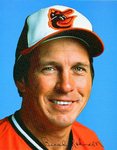 | BROOKS ROBINSON
Baseball Hall-of-Famer
Brooks Calbert Robinson, Jr. wasn't nicknamed "Hoover" for his resemblance to Herbert or J. Edgar but rather for his ability to suck up everything hit towards third base.
He won Gold Gloves every year from 1960 to 1975, led AL third basemen eleven times in fielding and eight times each in putouts and assists, and made more putouts, assists, chances, and double plays than any third baseman in history. He also spent a record twenty-three years with one team, the Orioles. Sportswriter Gordon Beard said, "He never asked anyone to name a candy bar after him. In Baltimore people name their children after him."
Robinson made his debut as an Oriole in 1955 and collected 2,848 hits in the regular season; however, no amount of work could make up for his basic lack of speed; he grounded into more double plays than any other ALer (297) and stole only 28 bases in his entire career.
He won the MVP award in 1964, hitting .317 with 28 homers and shone in postseason play. In 39 playoff and World Series games, he hit 5 homers and went 44-for-145, a .303 average. He hit an even .500 in the 1969 playoffs and .583 in 1970 as the O's crushed the Twins.
The 1970 World Series was the Brooks Robinson Show. In the opener he backhanded Lee May's bullet to keep the go-ahead run off base in the sixth inning and, with the score tied 3-3 in the seventh, homered over the left field fence to give the Birds a 4-3 win; In Game Two he knocked in the game-winner in a 6-5 squeaker.
All that was prologue to Game Three when Robinson did for fielding what Esther Williams did for swimsuits. He made sparkling plays on Tony Perez's shot down the line in the first, Tommy Helms' slow roller in the second, Johnny Bench's line drive in the sixth. He went 4-for-4 in Game Four and was named MVP when the Orioles won Game Five and the Series. The ultimate accolade came from Johnny Bench: "I will become a lefthanded hitter to keep the ball away from that guy."
When he retired in 1977, the Orioles gave credit where it was due by holding Thanks Brooks Day on September 18.The occasion drew the largest regular season crowd in Memorial Stadium's history. He entered the Hall of Fame in 1983.
|
|
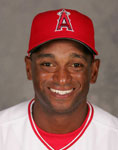 | CURTIS PRIDE
Angels Outfielder
Curtis Pride was born in Washington, D.C. on December 17, 1968. By the age of nine months, audiological tests confirmed that he was profoundly deaf from birth. At age two, his parents moved to Silver Spring, Maryland and enrolled Curtis in the Montgomery County Public School System's Auditory Service infant program. He was fully mainstreamed into his neighborhood schools from seventh grade until his graduation from John F. Kennedy High School in 1986.
In addition to graduating with a 3.6 GPA, Mr. Pride enjoyed an outstanding high school athletic career. He broke virtually all of the single season and career records for soccer, basketball and baseball at Kennedy High School. He was also a first team All-American soccer player and a member of the United States National Team that participated in the Junior World Cup in Beijing, China in 1985. As a result of his play for the U.S. Team, Mr. Pride was selected by Kick Magazine as one of the top fifteen youth soccer players in the world.
Just prior to his high school graduation, Mr. Pride -- who had already accepted a full basketball scholarship to the College of William and Mary -- was drafted by the New York Mets Baseball Organization. Through a unique arrangement negotiated among the Pride family, the Mets and the College of William and Mary, Mr. Pride signed with the Mets as a part-time professional baseball player while he also attended college as a full-time student athlete. He was a four-year basketball starter at point guard at William and Mary and graduated in 1990 with a degree in finance.
In 1992, Mr. Pride signed with the Montreal Expos as a minor league free agent. In 1993, he received a September promotion to the major leagues after batting a combined .324 with 21 home runs and 50 stolen bases in AA and AAA. Mr. Pride made the most of this opportunity as he finished his initial major league season with a .444 batting average, including a memorable double for his first major league hit that resulted in a five minute standing ovation from a capacity crowd at Montreal's Olympic Stadium.
In the spring of 1996, Mr. Pride was invited to spring training by the Detroit Tigers and won a spot on the major league team. He was with the Tigers the entire year, becoming the first regular full-season deaf player in the modern history of major league baseball. 1996 was, in fact, a breakthrough season for Mr. Pride, as he hit .300 in 267 at bats for the Tigers with 10 home runs and 11 stolen bases. He was also with Detroit for the majority of the 1997 season, and then signed in September 1997 with the Boston Red Sox. On September 19, 1997 Mr. Pride hit a home run at Fenway Park in his first at-bat for Boston, becoming only the seventh player in the long history of the Red Sox organization to accomplish that feat. In February 1998, Mr. Pride become a member of the Atlanta Braves, one of America's most successful and widely followed major league teams. He hit .252 in 70 games for the Braves in 1998 and played a valuable role in the team�s advancement to the National League Playoffs. Mr. Pride suffered an injury to his right wrist subsequent to the 1998 season and had surgery on the wrist in March 1999. He fully recovered from that surgery,
and his path back to the major leagues was completed in June 2000 when he was signed to a contract by the Boston Red Sox. In 2001 Mr. Pride rejoined the Montreal Expos. Then in the summer of 2003, Mr. Pride was signed by the New York Yankees and joined the Yankees roster in New York on July 4, 2003. Continuing his flair for the dramatic, on July 6, 2003 Mr. Pride hit a home run in his first game for the Yankees that resulted in a sustained standing ovation and �curtain call� from the sold-out crowd at historic Yankee Stadium. This memorable moment resulted in another collection of national media attention on Mr. Prides amazing story. In 2004, Curtis became a member of the Los Angeles Angels. He has played for the Angels in both 2004 and 2005, and has recently re-signed with the Angels for the upcoming 2006 season.
Mr. Pride receives hundreds of letters each year, primarily from young men and women with disabilities or their parents, and tries to make time to personally answer each and every letter. In addition, he makes numerous public appearances on behalf of children with and without disabilities. His incredible story has been featured in publications such as Readers Digest, Sports Illustrated and The Sporting News and newspapers such as the New York Times, Los Angeles Times and Boston Globe. The CBS Television show 48 Hours with Dan Rather did a nationally broadcast feature on Mr. Pride in April 1996, and has subsequently broadcast updates to that story in both 1999 and 2003.
Mr. Pride has received countless national and local awards for his achievements and his community service. Recent noteworthy honors include being selected by the U.S. Chamber of Commerce as one of the nation's ten outstanding Young Americans. Mr. Pride was also named the 1996-97 "Role-Model-of-the-Year" by the Alexander Graham Bell Association, and was selected by the Baseball Writers Association to receive the Tony Conigliaro Award, presented annually to a major league player who has overcome adversity through the attributes of spirit, courage and determination. |
|
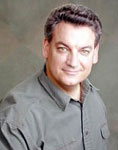 | DAVE DRAVECKY
Former Pitcher San Francisco Giants
Dave Dravecky’s story is one of hope, courage and perseverance in the midst of dark and overwhelming uncertainty. In 1988 Dave was at the top of his game and life. Not only did he have a wonderful family but he was reaching his all-star peak playing the game of his childhood dreams. His 5-1 opening day victory over the Dodgers was overshadowed later that fall by the discovery of cancer and the removal of half of the deltoid muscle in his pitching arm. For baseball fans worldwide Dave Dravecky etched his name into history on August 10, 1989. Defying all odds, after battling cancer in his pitching arm, Dave came back to pitch once again in the Major Leagues. People were on their feet cheering and anticipating the game while he stretched and warmed up. He became an inspiration not only to cancer fighters, but to all who needed hope that day.
As Dave took the mound, no one could deny the miracle that was taking place. After being told by his doctors, “Short of a miracle, you’ll never pitch again,” Dave pitched a 4-3 win for the San Francisco Giants. Sadly, Dave’s comeback was short-lived. Five days later, in Montreal, Dave threw “…the pitch that could be heard round the world.” Dave’s arm had split in two. As he tumbled to the ground, his mind filled with doubt and fear. Little did he know that the dream he had since he was a little boy, was simply a platform for his purpose to share hope with the suffering around the world.
Dave’s triumphant defeat of the cancer and his return to the game of baseball is chronicled in his award winning book, Comeback, which has sold more than 650,000 copies. After Dave’s comeback and fall from the mound, with the weakened bone, the cancer returned yet again. The arm was not going to get better at this point so Dave decided to retire from his dream, the game of baseball, in November of 1989.
Slowly the treatment and the cancer ate away Dave’s arm and simultaneously his career. Radiation treatment after radiation treatment resulted in a staph infection that placed a hole in the middle of his arm exposing bone. Finally, the arm along with Dave’s shoulder blade and left side of his collar bone had to be amputated for fear the cancer would spread and take Dave’s life. In the book, When You Can’t Comeback, written with his wife, Jan, Dave describes his loss:
“My arm caught the attention of the entire school, when, as a teenager, I pitched my first no hitter…(Later) my ability to provide for my family was not based on how smart I was or how hard I worked. It was based solely on what my arm could do on game day. When people talked with me, it was the center of conversation. ‘How’s the arm today, Dave? Is your arm ready for tonight?’ My arm was to me what hands are to a concert pianist, what feet are to a marathon runner. It’s what made me valuable, what gave me worth in the eyes of the world. Then suddenly my arm was gone.”
Dave continues to examine the impact of the amputation on his life in his book, The Worth of a Man. With the absence of his arm, Dave seemed to be stripped of his identity. He began to ask questions many men ponder. Where does my worth come from? What creates my value and identity? Is there more to me than the game of baseball? Is there more to me than my left arm? After a long search, Dave discovered his true worth could never be shaken by adversity or loss. He realized nothing that he did based on worldly success could place value on his life or create his identity. In his book, Dave offers men a new definition of worth.
Because of the overwhelming response to their story and their desire to walk along side others who suffer, Dave and Jan founded Dave Dravecky's Outreach of Hope, a nonprofit organization in Colorado Springs, Colorado. The Draveckys realized through their own experiences that one cannot battle cancer alone, so they have created this ministry to bring hope for those who hurt.
Dave is in great demand as a speaker with a story that reaches all age groups, his messages range from motivational to inspirational to evangelical. Dave Dravecky genuinely relates through his own experiences with loss and suffering, and he powerfully inspires through the encouragement he gathered from the faith and hope he discovered along his journey.
|
|
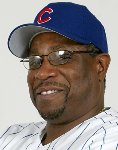 | DUSTY BAKER
Dusty Baker was three-time Manager of the Year (1993, '97 and 2000), completed his 10th season as Giants' skipper in 2002, and became the third Giants skipper to man the helm for ten seasons, joining John McGraw (31 years, 1902-32) and Bill Terry (10, 1932-41). He became the 1st NL manager and only the 2nd skipper to earn three BBWAA Manager of Year honors (Tony LaRussa, 1983, '88 and '92). Baker also became the fifteenth skipper to earn The Sporting News Manager of Year honor for 2nd time in his career. Baker was the 34th manager in Giants franchise history. His 840 victories rank second on the franchise list for managers, behind only McGraw (2,064). Baker has managed 1,555 games and also ranks 2nd amongst Giants managers (McGraw, 4,424). Dusty Baker has guided the club to post season on 3 different occasions, winning 2 NL West titles (1997 and 2000) and earning the Wild Card berth in 2002. Overall, he has finished in the top 2 spots in the division 8 times in 10 years. Baker has had the 2nd-longest tenure with his current club among all ML skippers, trailing only Atlanta's Bobby Cox (12 seasons with Braves). Baker is 8th among current big league managers with 840 career wins. His .540 career winning percentage (840-715) ranks 2nd among the nine current ML head men with at least 1,300 games managed (only Cox, with 1,805-1,404; .562) boasts better.
2002: Dusty Baker piloted SF to their NL Wild Card berth with 95 victories, matching the 1965 club for the 4th-highest win total in SF history. The Giants finished 2nd in the NL West, marking the 1st time the club has finished in either 1st- or 2nd-place for 6 consecutive years since 1917-25, when Giants did it 9 straight seasons. SF also reached a 90-win level for the 3rd straight season for the 1st time since accomplishing the feat 4 years in row from 1964-67. Baker moved past Terry for the 2nd most games at the helm of the Giants July 26 vs. LA, managing his 1,497th game. He logged his 800th victory on July 18 with a 3-2, 12-frame triumph at Dodger Stadium. Dusty became the 2nd-winningest manager in franchise history with his 824th career victory, 1-0 blanking of the Diamondbacks Sept. 6.
2001: Baker guided the Giants to 2nd place in the NL West, finishing 2 games behind eventual World Champion Arizona Diamondbacks. Baker kept the club in contention for both the division title and the wild card spot until the 160th game. He captured his 700th win on July 5 at LA (3-2) and was selected to serve as coach for National League club at All-Star game in Seattle, marking his 3rd coaching trip to the Mid-Summer Classic. He underwent successful surgery for prostate cancer Dec. 17 at Stanford Hospital, undergoing a 3-hour procedure. Dr. Joseph Presti removed the cancerous prostate, and a biopsy performed on surrounding lymph nodes proved negative.
2000: Baker was named NL Manager of the Year by both BBWAA and The Sporting News after guiding the Giants to the NL West championship with a Major League-best 97-65 mark. He moved past Roger Craig June 12 with his 587th career victory, 10-3 triumph over Cincinnati to become the winningest manager in SF Giants history. Baker posted his 600th career victory in the 2nd game of a July 4 twinbill, 3-0 victory over Colorado. He passed Craig for most contests at the helm of the SF Giants (1,153) July 7 with a 4-2 win at St. Louis. Dusty moved past Leo Durocher for 3rd place on the Giants franchise list for games managed with his 1,161st game July 18 vs. Texas. He earned his 638th victory on Sept. 4 vs. Philadelphia to pass Durocher for 3rd place on franchise list.
1999: Baker posted his 500th win on June 1 in Philadelphia and became only the 2nd SF manager to reach the 1,000-game mark at the helm on July 18 at Texas, joining Craig (1,152).
1998: Baker guided the Giants to one of best comebacks in recent times, gaining 5.0 games over the final 10 regular season contests to force a tie-breaker game with Chicago for the NL Wild Card spot. However, SF was eliminated from the race 5-3 at Wrigley Field on Sept. 28. Dusty earned his 400th career win on May 5 with 8-2, 10-inning triumph over the Marlins.
1997 Baker was named NL Manager of the Year by BBWAA and The Sporting News, marking 2nd time he had been honored (also 1993). He led the Giants to their 1st NL West championship since 1989, posting 90-72 ledger. The Giants were only the 4th team in history to finish in 1st place after a last place standing the previous year. Baker was selected to serve as coach for the National League club at the All-Star Game in Cleveland; it was the 2nd time he'd been chosen.
1996: Baker faced great adversity during this season as the Giants used the Disabled List for a franchise-record 22 times (16 injured players). He managed a group of Major League All-Stars that defeated the Japanese All-Star team 4 games to 2 with 2 ties during post-season tour of Japan.
1995: Baker registered his 200th career victory in the Giants' 3-1 victory over the Dodgers Aug. 6.
1994: Baker led SF to their 2nd place finish in the NL West, finishing 3.5 games behind LA in that strike-shortened season.
1993: Baker was named BBWAA National League Manager of Year and AP Manager of Year in his rookie campaign. He came within 1 game of winning the NL West, guiding the club to the 103-59 mark, 2nd best record in majors. 103 wins tied the SF mark, equaling the 1962 N.L. champs (103-62). Dusty Baker won more games than any other rookie manager in National League history and became only the 4th manager to win 100 games in his rookie campaign.
1988-92: Prior to being named the Giants' skipper, Dusty served 5 seasons as coach under previous manager Roger Craig, and before that, served as 1st base coach in 1988 and as hitting instructor from 1989-92. |
|
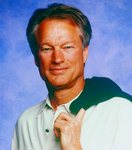 | JIM BOUTON
Former Pitcher, New York Yankees
On his high school junior varsity baseball team his Jim Bouton's nickname was "Warm Up Bouton" because all he ever did was warm up, he never got into the games. The goal of becoming a major league pitcher was considered "unrealistic," so he did his Career Week essay on becoming a forest ranger.
People are still having trouble predicting what Jim Bouton will do next. In 1963 Jim Bouton won 21 games for the New York Yankees and made the all-star team. In 1964 Jim Bouton won 18 games and beat the Cardinals twice in the World Series.
In 1970 Bouton wrote Ball Four, the funny, irreverent, all-time bestseller which revealed baseball players as human beings. Ball Four was recently selected by the New York Public Library as one of the "Books of the Century."
In 1970 Jim Bouton retired from baseball and became a TV sportscaster in New York where he helped WABC-TV and then WCBS-TV climb to 1st place in the ratings. During the 70's he also wrote a sequel to Ball Four entitled I'm Glad You Didn't Take It Personally, won good reviews in a movie called The Long Goodbye, and created, wrote and acted in a network situation comedy based on his book.
In 1978 Jim Bouton made a comeback to baseball with the Atlanta Braves. Gambling his television career for a dream, Bouton rode hot buses and ate cold hamburgers for two years in the minor leagues before he was called up by the Atlanta Braves. When the 39 year old knuckleballer beat the San Francisco Giants 4-1, it was his first major league win in eight years.
During his comeback Jim Bouton invented Big League Chew, shredded bubble gum in a pouch, for ballplayers who want to look right without getting sick. Big League Chew, which has replaced chewing tobacco at many high schools and colleges, is one of the most popular bubble gums on the market.
In 1996 Jim Bouton received the highest honor of his career when he was featured in The Sports 100, "The One Hundred Most Important People in American Sports History," published by Macmillan. This book, which covers 150 years, contains only 21 people from the world of baseball.
Jim Bouton's first novel, Strike Zone, is now in paperback, is a frequent guest on radio and television. His hobbies are building stone walls, ballroom dancing, and pitching semi-pro baseball.
|
|
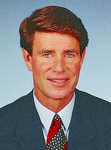 | JIM PALMER
Baseball Hall-of-Famer
Jim Palmer is the only American League Hall of Fame Pitcher to win the Cy Young Award three times. He was elected to the 1990 Baseball Hall of Fame in his first year of eligibility. Jim Palmer was the youngest pitcher in history to pitch a World Series shutout and the only pitcher to win World Series games in each of three decades. Today, Palmer is a sportcaster on ABC and ESPN and national sports chairman for the Cystic Fibrosis Foundation. Jim Palmer's favorite topics are "The Palmer Way to Fitness" and "Striving for the Best." |
|
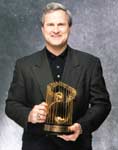 | JIM SUNDBERG
After playing the game he loves, Jim Sundberg worked announcing the game as a broadcaster for six years as one of Texas' most popular on-air sports personalities. Off-season, he began his own business, creating youth sports training material which is sold nationwide.
Now, Jim Sundberg manages his time doing what he enjoys most: building his innovative company, and communicating the thrills - and lessons - of victory to enthusiastic audiences from many of America's top businesses.
Jim Sundberg's refreshing personality and warm speaking style enable him to convey valuable insights in ways people can easily understand. Using his wit and humor to blend business principles with baseball analogies, Jim proves to be a top performer even off the field!
Why have so many well-known companies chosen Jim Sundberg to address their groups? The answer is simple: successful transition. Not only has Jim experienced victory at the world-class level, but he's also a successful businessman who still knows how to get the job done!
SPORTS
* 16 years in Major League Baseball:
Texas Rangers, Chicago Cubs, Kansas City Royals, Milwaukee Brewers
* 6-time American League Gold Glove catcher
* 3-time American League All-Star
* 1985 World Series Championship catcher with the Kansas City Royals
* "1985 World Series Hero" as voted by the Chicago Writers group
...and broadcasting the game...
* 6 years as color analyst for Texas Rangers Television
* "Best Broadcast Team" member as voted by the Dallas Observer in 1995
BUSINESS
Founder in 1994 and owner of Sports Training Systems Creator of the Practice Planner fundamentals learning system, sold nationwide in hundreds of retail outlets Motivational speaker for corporate and non-profit organizations for the past 20 years
PERSONAL
Married to wife, Janet, for nearly 30 years with three children A resident of the Dallas/Fort Worth, Texas, area for over 25 years Longtime supporter of Athletes in Action and the Fellowship of Christian Athletes
COMMUNITY
Namesake and first recipient of the Texas Rangers' annual "Jim Sundberg Community Service Award" for outstanding volunteer involvement in the north Texas area
Voted "Arlington Man of the Year" in 1994 by the Boys and Girls Clubs of Arlington (TX) in recognition of his outstanding community volunteerism
Past member of the Governor's Commission for Physical Fitness (TX) |
|
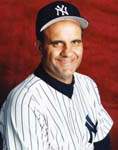 | JOE TORRE
Manager of the New York Yankees
An All-Star catcher in the 1960s, Joe Torre moved to third base during the 1971 season and won the NL MVP award, leading the league with a .363 batting average and 137 RBI. He finished his playing career with a .297 average, 252 HR and 1,185 RBI.
Joe Torre began his managerial career in 1977 with the Mets, the last team for which he played. The Mets' best finish was fourth place in the second half of the strike-shortened 1981 season.
Moving to Atlanta the following season, Torre rode a 13-0 start to the division title, finishing 89-73. The Braves finished second the following two seasons, although a mediocre 80-82 record in 1984 led to his dismissal. He went on to become a popular Angels broadcaster.
In August 1990, Joe Torre returned to the bench as manager of the St. Louis Cardinals, Torre guided St. Louis to a respectable 84-78 finish in 1991, good for second place behind the Pirates in the NL East.
The team won 83 the following year and 87 in 1993, finishing third in the division both times. But in Joe Torre 1994, the Cards tied for third in the new NL Central after a 53-61 record and after a 20-27 start to the 1995 season Torre was fired in favor of Mike Jorgensen.
The Yankees, who had finished second in the AL East under Buck Showalter, hired Torre to lead the club in 1996. Torre was happy to get a chance to return home to the New York area, and proved to be up to the task of managing in the Bronx.
In just his first year with the club, Joe Torre led the Yankees to a 92-70 finish and after a tumultuous post-season (during which Torre's brother Frank lay in a NYC hospital awaiting heart surgery) his team vanquished the Atlanta Braves for the Yankees' first championship since 1978.
Joe Torre and the Yankees won 96 games in 1997, but lost a heart-wrenching five-game series to Cleveland in the first round of the playoffs. Fueled by this disappointment, the Yankees put together a historic 1998 season.
Torre's calm, laid-back manner was a perfect fit for the club's collection of self-motivated veterans, and New York ran away from their competition for an American League-record 114 wins.
|
|
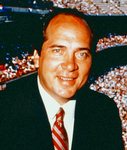 | JOHNNY BENCH
1989 Baseball Hall of Fame Inductee
Johnny Bench was born in Oklahoma City, Oklahoma on December 7, 1947. The third of four children of Ted and Katy Bench, he was All-State in basketball and baseball at Binger High School and the Valedictorian of his graduating class. Johnny’s childhood dream was to become a major league baseball player and his father counseled that the position of catcher was the most direct route to that goal. Taking that advice, he was selected in the 1965 amateur draft by the Cincinnati Reds and signed with them. After two seasons in the minors, Bench made Cincinnati’s Major League roster for the 1968 season. This marked the beginning of one of the most successful careers in baseball history and to Johnny’s ascension as a celebrity.
Today Johnny enjoys a well-rounded, stellar career. By making the transition from athletic superstar to successful broadcaster, he has proven himself a winner in two of the most popular areas in American culture: baseball and the media. Elected to the Baseball Hall of Fame in January 1989 with the fourth highest percentage of total votes cast, Bench is undoubtedly the greatest catcher ever. His honors include National League Rookie of the Year (1968), National League Most Valuable Player (1970 & 1972), World Series MVP (1976), 14-time All-Star, with 10 consecutive Gold Gloves. In 1980 Bench set an endurance record by catching 100 or more games for 13 consecutive seasons.
He maintains a sense of balance by using his celebrity status to aid worthy causes, such as the Heart Association, the American Cancer Society (as National Chairman of “Athletes vs. Cancer”), the Kidney Foundation, Franciscan Sisters of the Poor Health System and Muscular Dystrophy. He also supports the Cincinnati Symphony, the Museum of Science and Industry, and his own Johnny Bench Scholarship Fund, which grants financial aid to Greater Cincinnati-area college students.
Bench has enjoyed maximum national visibility through his thousands of hours of entertainment experiences and personal appearance of the Bob Hope Christmas Shows in the Far East has sung with the Cincinnati Pops, authored books including Baseball For Idiots, and hosted a wide range of television programs, from his Emmy Award-winning instructional show The Baseball Bunch, a 1984 PBS special Billy Sunday, and various baseball oriented programs. The year 2000 marks Johnny’s 27th anniversary as spokesperson for Fifth Third Bank based in Cincinnati. He has appeared in hundreds of advertising campaigns promoting the banks’ products and services as well as teaming up to support a variety of community events.
Johnny spent nine years with CBS Radio broadcasting the National Game of the Week, the All-Star Game, the League Championship Series and the World Series. He has worked Reds baseball on television and continues into his year as a co-host of a daily in-season radio show focusing on baseball and now is a special consultant to the General Manager of the Cincinnati Reds. Johnny’s passion for golf has grown and spread into business opportunities from hosting Mastering Golf and Golf in Paradise, two cable shows featuring guests and golf tips. Johnny played in three Senior Professional Golf events in 1998 and on the Celebrity Golf Tour (CPT). CPT has between twelve and fifteen events in 1999 and will keep him on the move.
Using a blend of sincerity, credibility and wit, Johnny Bench can move easily from the world of sports and entertainment to civic involvement, from culture to business. He is a symbol of winning through hard work as outlined in his presentation featuring The Vowels of Success which highlights easy to remember motivational tips.
|
|
| SPARKY ANDERSON
Former Manager of the Detroit Tigers
Legendary baseball manager Sparky Anderson is the third winningest manager in baseball history. From 1970 through 1978, Sparky Anderson led the Cincinnati Reds to five National League West Division titles, four pennants, and two World Series victories. From 1979 to 1995, Sparky was at the helm of the Detroit Tigers. Under Sparky Anderson's leadership, the Tigers won the World Series in 1984 and took the American League East Division title in 1987. Sparky Anderson is the only manager in history to win a World Series in both the American League and the National League as well as the first to win 100 games in a season in both leagues. Sparky Anderson is an ambassador for baseball, and a committed philanthropist. In 1987 , he founded the charity CATCH to aid underprivileged children in Detroit. |
|
1 2 |








